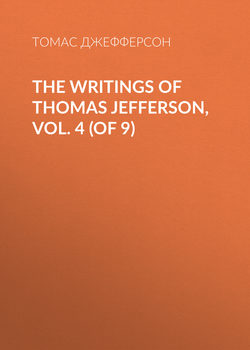Читать книгу The Writings of Thomas Jefferson, Vol. 4 (of 9) - Томас Джефферсон, Thomas Jefferson - Страница 69
TO JAMES MADISON
ОглавлениеMonticello, March 6, 1796.
Dear Sir,—I wrote you February the 21st, since which I have received yours of the same day. Indeed, mine of that date related only to a single article in yours of January the 31st and February the 7th. I do not at all wonder at the condition in which the finances of the United States are found. Hamilton's object from the beginning, was to throw them into forms which should be utterly undecypherable. I ever said he did not understand their condition himself, nor was able to give a clear view of the excess of our debts beyond our credits, nor whether we were diminishing or increasing the debt. My own opinion was, that from the commencement of this government to the time I ceased to attend to the subject, we had been increasing our debt about a million of dollars annually. If Mr. Gallatin would undertake to reduce this chaos to order, present us with a clear view of our finances, and put them into a form as simple as they will admit, he will merit immortal honor. The accounts of the United States ought to be, and may be made as simple as those of a common farmer, and capable of being understood by common farmers.
Disapproving, as I do, of the unjustifiable largess to the demands of the Count de Grasse, I will certainly not propose to rivet it by a second example on behalf of M. de Chastellux's son. It will only be done in the event of such a repetition of the precedent, as will give every one a right to share in the plunder. It is, indeed, surprising you have not yet received the British treaty in form. I presume you would never receive it were not your co-operation on it necessary. But this will oblige the formal notification of it to you.
My salutations to Mrs. Madison, friendly esteem to Mr. Giles, Page, &c. I am, with sincere affection, yours.
P. S. Have you considered all the consequences of your proposition respecting post roads? I view it as a source of boundless patronage to the executive, jobbing to members of Congress and their friends, and a bottomless abyss of public money. You will begin by only appropriating the surplus of the post office revenues; but the other revenues will soon be called into their aid, and it will be a source of eternal scramble among the members, who can get the most money wasted in their State; and they will always get most who are meanest. We have thought, hitherto, that the roads of a State could not be so well administered even by the State legislature as by the magistracy of the county, on the spot. How will they be when a member of New Hampshire is to mark out a road for Georgia? Does the power to establish post roads, given you by the Constitution, mean that you shall make the roads, or only select from those already made, those on which there shall be a post? If the term be equivocal, (and I really do not think it so,) which is the safest construction? That which permits a majority of Congress to go to cutting down mountains and bridging of rivers, or the other, which if too restricted may be referred to the States for amendment, securing still due measures and proportion among us, and providing some means of information to the members of Congress tantamount to that ocular inspection, which, even in our county determinations, the magistrate finds cannot be supplied by any other evidence? The fortification of harbors was liable to great objection. But national circumstances furnished some color. In this case there is none. The roads of America are the best in the world except those of France and England. But does the state of our population, the extent of our internal commerce, the want of sea and river navigation, call for such expense on roads here, or are our means adequate to it? Think of all this, and a great deal more which your good judgment will suggest, and pardon my freedom.
